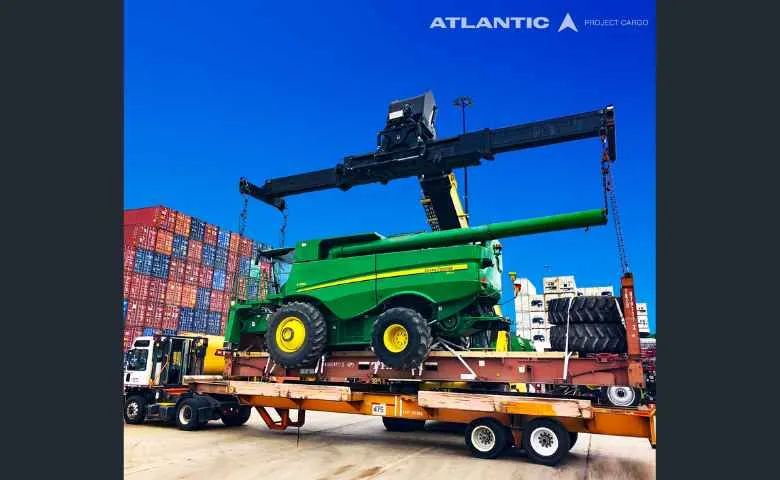Last Updated on November 27, 2023 by Admin
Global shipping of heavy farm equipment presents unique challenges, particularly when navigating customs and regulatory hurdles. This article explores these challenges and the strategies companies employ to overcome them, focusing on American and international customs brokerage.
Table of Contents
Expanded Understanding of Global Heavy Farm Equipment Shipping
Global shipping of heavy farm equipment, such as tractors, combines, and other agricultural machinery, requires intricate knowledge of international trade regulations. Each country’s customs procedures and import/export regulations add complexity to the shipping process. Companies must be well-prepared to handle these complexities to ensure timely and efficient equipment transport.
Customs brokerage is more than just a facilitation service; it’s a critical component in international trade. A customs broker’s role extends beyond paperwork; they provide strategic advice, ensure compliance with trade agreements, and sometimes even liaise with transport and logistics companies to ensure a smooth transition through customs.
Practice 15+ AI-generated technical and HR interview questions for Civil, BIM, QS, Planning, HSE and Construction roles. Get instant feedback, improved answers, a 7-day improvement plan, and a full PDF report. Designed exclusively for construction professionals.
One free full interview session included. No credit card required.
Considering Global Customs and Regulatory Requirements
The global landscape of heavy farm equipment shipping is diverse, with each country presenting unique customs and regulatory challenges. These examples highlight the distinct approaches and issues faced in different regions and offer insights into how customs brokerage adapts to varying international standards and regulations. Understanding these nuances is essential for companies involved in the global shipping of heavy farm equipment.
American Customs Brokerage
In the United States, customs brokerage is centered around compliance with the U.S. Customs and Border Protection (CBP) and other regulatory agencies like the USDA. The brokers ensure that heavy farm equipment meets all U.S. standards, including environmental and safety regulations.
European Union
In the European Union, customs brokerage faces different challenges. EU regulations focus heavily on environmental standards, such as emission levels of farm machinery. Brokers must navigate the EU’s complex tariff system and its various trade agreements with non-EU countries.
Australia
Australia has stringent biosecurity laws to protect its unique ecosystem. Customs brokers here must ensure that imported farm equipment does not carry soil or plant matter that could harbor pests or diseases. This often requires thorough cleaning and inspection procedures before shipment.
South America
In addition to Brazil, other South American countries like Argentina and Chile have unique customs requirements. These countries may have specific import regulations to protect local industries or environmental standards. Customs brokers in these regions need to be familiar with the South American trade bloc Mercosur’s regulations and how they impact the import of heavy farm equipment.
Asia
Asia, as a diverse region, presents a multitude of regulatory environments. Countries like India and Japan have distinct requirements for importing heavy farm equipment, often focusing on safety standards and environmental impact. Navigating these diverse regulations requires brokers to be well-versed in Asia-specific trade laws and customs practices.
Advanced Strategies for Overcoming Challenges
Navigating the complexities of customs and regulatory compliance in heavy farm equipment shipping demands more than basic knowledge and procedures. From leveraging cutting-edge technology to developing global compliance programs and building a robust network of international partners, the following strategies represent the forefront of managing the challenges associated with global heavy farm equipment shipping.
- Global Regulatory Expertise: Companies must develop in-house expertise in global customs regulations or partner with experienced international customs brokerage firms.
- Technology Integration: Utilizing advanced logistics software and AI for predictive analytics helps plan and overcome potential customs clearance obstacles.
- Global Compliance Programs: Smooth operations require comprehensive compliance programs that cover various international standards and regulations.
- Diversified Shipping Routes: Diversifying shipping routes and methods can help mitigate risks associated with specific regional regulations and delays.
- Continuous Training and Development: Continuous training for staff in international trade regulations and customs processes is crucial for staying ahead in the dynamic global trade environment.
- Strong Global Network: Building a solid network of global partners, including local brokers in different countries, can facilitate smoother customs processes.
How A Capable Solution Provider Can Help with Customs and Regulatory Challenges
With extensive global logistics and customs brokerage expertise, a capable solution provider well-versed in customs and regulatory requirements can be an invaluable partner for companies facing the challenges of shipping heavy farm equipment globally. A capable solution provider must exhibit an understanding of international trade regulations and strong relationships with customs authorities across various regions, including Europe, South America, Asia, and Africa, uniquely positioning companies to navigate complex customs and regulatory hurdles. A provider’s ability to adapt to regional specificities, use of advanced logistics technology, and global compliance strategies ensures efficient and compliant shipping solutions for heavy farm equipment worldwide.
Atlantic Project Cargo’s customs brokerage services are crucial in the global agricultural sector. By expertly handling the customs clearance of heavy farm equipment, they facilitate its worldwide transportation, directly benefiting the agricultural industry. This service ensures that innovative farming technologies efficiently reach farmers and agricultural businesses, leading to enhanced farming practices. The broader impact of this is significant, as it supports those within the industry and contributes to global food production and sustainability, ultimately benefiting people worldwide who rely on advanced and efficient agricultural methods.
Related Posts:
- Cost-Effective Ways To Ship Construction Equipment
- Construction Equipment Management Software is Here to Stay
- How Equipment Management Software is Hacking the Construction Industry
- 7 Career Progression and Advancement Opportunities for Construction Equipment Operators
- 4 Things You Need To Know About Compact Construction Equipment
- What Hardware & Equipment is Required For a Tunnel Construction Project?
- The Importance of Expert BIM Management Services in Complex Construction Projects
- Top 30 Green Jobs for 2023 and beyond
- Is your Home’s structure strong enough for these Shingles?
- Where Can I Get Help with Math to Solve My Academic Complications?


